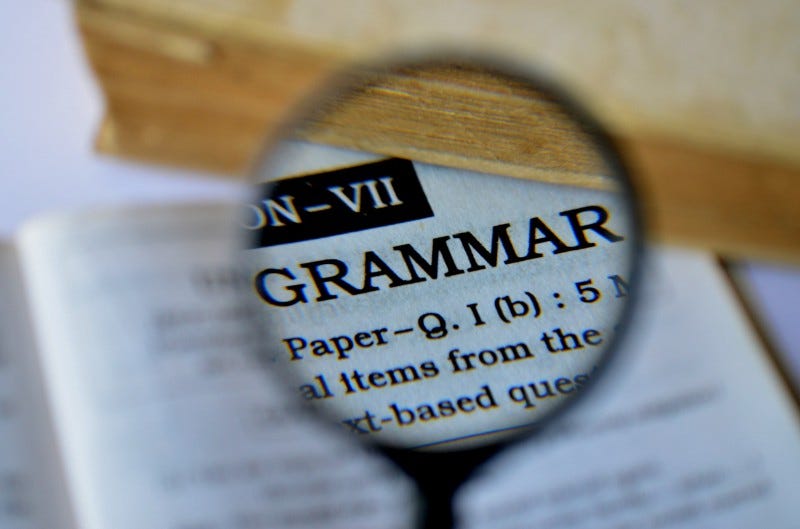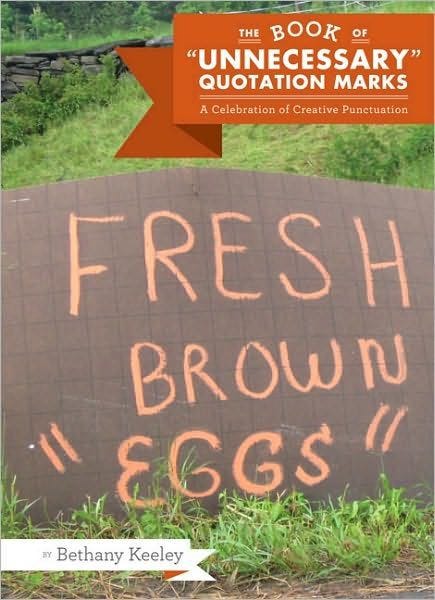No, It's Not National Grammar Day
But if it was, would you care? No? You're in the right place!
In 2008, Martha Brockenbrough, founder of the Society for the Promotion of Good Grammar, designated March 4 as National Grammar Day.
Who knew? And, more important, who cares? (Somebody does, obviously, and her name is Martha.)
But it’s a National Day — among some 1500 others — so as writers we should at least pretend we care. I’ll go first. Here’s my take on grammar and punctuation from a chapter from Writing While Old, one of my three books-in-progress: (As you’re reading this you might have to pretend you’re reading a real book. It’ll make more sense that way, until the real thing comes along.)
Grammar and punctuation: I don’t get it, so this won’t take long.
“Grammar is a piano I play by ear, since I seem to have been out of school the year the rules were mentioned. All I know of grammar is its infinite power” — Joan Didion
I can almost guarantee that every person reading this knows more about the rules of punctuation and grammar than I do. (Can I use “than I do” at the end of that sentence? I don’t know and I don’t care.) Writing clearly is our goal here and, yes, there are rules, but if you let yourself get bogged down by rules early on, there will be no later on. You’ll quit. We can’t have that.
There are hundreds of books out there that will tell you where you’re going wrong grammatically and punctuationally (Don’t use that word, I made it up). If that sort of thing means something to you, I’ll warn you, you’ll learn nothing new here. In fact, if you follow my lead you might find yourself having to unlearn whatever it is you think you picked up here. (I put this out here because every book I’ve ever read on writing has a section about grammar. I’m going to pretend I know what I’m talking about. Just play along, okay?)
A while back I commented on a website forum post using a quote within a sentence to make my point. Before I hit “publish” I went over my comment and everything looked fine to me, but within an hour I got a private email from one of the forum folk accusing me of tricking him into believing I was British because I had put the period outside the quote instead of inside. (The way any real American would know to do, I guess is what he was saying.)
Well, honestly? Until that guy with way too much time on his hands pointed it out, I had no idea there was that important regional difference between inside and outside periods. Now that I know, I will try not to ever, ever do it AGAIN.
Say this was the sentence: The one thing I can’t stand is when someone who doesn’t even know me has the gall to email me to let me know that “in America we put the period inside the quote, not outside, as is done in England, even when part of the sentence isn’t in quotes.”
So that’s the right way. Now picture the above last period outside the quotation mark instead of inside, where it apparently belongs here in America. How offensive would that be to you?
Thank you.
It’s that kind of thing. . .
(See how I started that sentence above with ‘So’? I do that. You’ll have to get used to it if you’re going to keep turning pages.)
But while we’re on quotation marks, there are people who just go nuts when they’re used wrong and unnecessarily. My college-educated grandson is one of them, and he has made it his life’s mission to point out just how misused they are in everyday life, especially in advertising signage. So this Christmas I had to bite my tongue not to point out to this darling man that, as smart as he is, he could have taken that little hobby and turned it into something useful, like putting together a book of examples of egregious and often hilarious usage on signs. That way he would be collecting royalties on the thing instead of receiving just such a work as a Christmas present.
Then there’s that ongoing battle over how many spaces one should allow between sentences. (About “one should allow”: It’s snooty and not at all like me but it seemed to fit there because the subject is a bit snooty. It’s rare when I do that, and I hope it’ll be even rarer when you do.)
There’s an argument among certain priggish internet denizens over sentence spacing. There are the one-space people pitted against the two-space people (that used to be me before they broke me), and I guarantee the definitive answer will still be floating around out there when the world as we know it ends and only the cockroaches are left. There are logical reasons for doing it both ways, but I like the way two spaces looks between sentences and that’s the way I do it when I think I can get away with it.
The one-spacers argue that it’s us oldsters who keep muddying up the rule, since we learned to type on ancient typewriters that didn’t even automatically fix letter-spacing, so in the olden days it really did look better when there were two spaces between typewritten sentences. Now, with modern technology, we don’t need that extra space. So look how much space we could save if we would just learn to hit that space bar once instead of twice after that period. (I’m not kidding. That’s what they say. And do. And, okay, as much as I like that double-spacing between sentences, if you’re reading this book in published form and there’s just one space between, I either did what I was told or somebody went above my head and did it in spite of me.)
And about those ellipses (those three dots at the end of that partial sentence four paragraphs above): I like the look of three of them separated by spaces. Others think there should be no spaces in between. Still others think ellipses should be eradicated from the face of the earth.
I like them. I like the visual effect of dots and dashes and ellipses and italics and parens and exclamations. They add drama and flair to otherwise dull sentences. But I’ll be the first to admit there is such a thing as overdoing. I love chocolate and whipped cream to the point of obsession, but every now and then I know when to quit.
I like partial sentences, too. There are times when I separate what should be a single sentence into two or even three partials. See above paragraph. I could have reworked sentences 2, 3 and 4 into one sentence, but I didn’t. It would have fixed the problem of starting a sentence with “But”, which, again, is apparently a huge no-no. But I think that much white space adds more emphasis to each thought and it looks like I’m taking a breath. I like that.
Now let’s tackle the Oxford comma. Don’t ever bring it up at a party. The party will be over and anything that isn’t nailed down will either be on the floor, on the ceiling, on the wall or plastered in your hair. (See what I did there? Yes? You’re a true free spirit. I love that about you!)
But one more thing before we move on: I’m really glad to know that my generation knows how to spell the word “definitely”. They’re spelling it “definately” these days and it’s one of those things, like “grammer” for “grammar”, or “loose” for “lose”, that just bites.
So thank you, my peers, for knowing the difference. It’s the little things, right?
________________________________
Really useful article about why grammar rules suck: https://www.smithsonianmag.com/arts-culture/most-of-what-you-think-you-know-about-grammar-is-wrong-4047445/
So if you liked this chapter of a book I keep putting off finishing, I beg you to nag me to finish it. If you didn’t like it, it goes without saying that the polite thing to do would be to zip it and move on. I trust you to do the right thing. 😘





i gave up on grammar a long time ago / complete sentences were the next to go / spelling however is sacrosanct / i will correct people on facebook for mis-spellings and facebook is not exactly known for it's high literary standards
You crack me up, and I feel you on every point above. Since I started my newsletter, I've tried to get better about everything above, but muscle memory takes a lot of re-learning, 62 years to be exact.